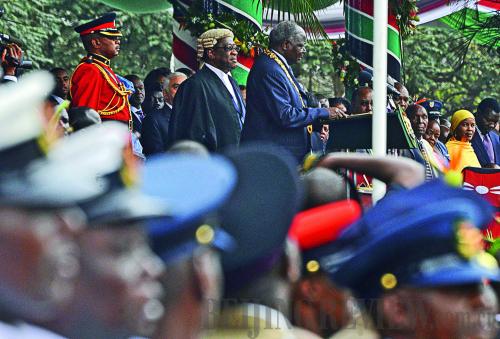|
 |
|
MAKE OR BREAK: Kenyan President Mwai Kibaki [right] will be in the spotlight in 2011 (XINHUA) |
For Kenya, the year 2011 is the year when the country will determine whether it wants to move to the promised land of justice, good governance and prosperity; or sink back to its dubious past of tribalism, impunity, corruption and extreme poverty.
It's a make-or-break year for the 47-year-old independent country. Looking at the government's in-tray for the New Year, it is a safe conclusion to say that the country is taking no chances when it comes to its push for a brighter future.
At the historic meeting held in November 2010 in Kenya's Ukunda, a coastal resort town, the country's president set the tone when he reminded top government officials that there was no room for dilly-dallying when it came to the implementation of the new law.
"We must be willing to let go of the old order that was ended by this Constitution and fully embrace the new order that it has ushered in," President Kibaki told a meeting of cabinet ministers and influential lawmakers.
Government's tasks
So as the year begins, Parliament will have at least 10 pieces of legislation it has to work on –within 12 months - to set the base for a new governance regime. Top of the list are laws to do with dual citizenship targeting Kenya's bulging and vibrant Diaspora, the electoral laws, ethics, and human rights.
Already, Parliament has been in overdrive meeting constitutional deadlines in selecting nominees to sit in the Judicial Service Commission, the Commission on the Implementation of the Constitution and the Commission on Revenue Allocation.
Besides, Kenyans expect a new Chief Justice to take office by next month (February 27) and a new Attorney General (by August 27).
Still, there's the new electoral body –the Independent Electoral and Boundaries Commission - that has to be in place by August this year, to help midwife next year's elections.
Going by the experience of the last general elections, and the ongoing controversy over the delimitation of electoral boundaries, then the country has to be wary lest it flares up in the next elections.
Also, the roadmap to national healing and reconciliation is expected to be out this year when the Truth, Justice and Reconciliation Commission hands its report to the President and to Parliament. The commission has been dogged with a cash shortage of Sh1 billion ($12.5 million) and credibility questions about its Chairman Bethuel Kiplagat, but still, it has managed to stick together and go ahead with its work.
The commission's report will provide answers to Kenya's horrid past and the attendant injustices. It will also propose how the country will move forward as "one people with one destiny."
|